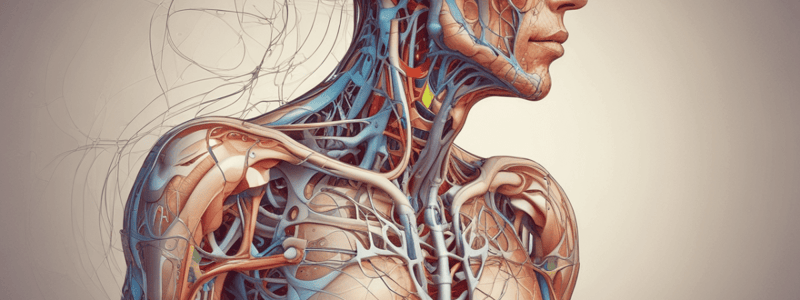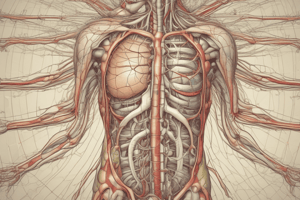Podcast
Questions and Answers
What is the primary function of the parasympathetic nervous system in terms of heart rate regulation?
What is the primary function of the parasympathetic nervous system in terms of heart rate regulation?
- Maintain constant heart rate and myocardial contractility
- Only regulate blood pressure
- Increase heart rate and myocardial contractility
- Decrease heart rate and myocardial contractility (correct)
What is the effect of norepinephrine on heart rate and myocardial contractility?
What is the effect of norepinephrine on heart rate and myocardial contractility?
- Increase heart rate and myocardial contractility (correct)
- Increase heart rate and decrease myocardial contractility
- Decrease heart rate and myocardial contractility
- Decrease heart rate and increase myocardial contractility
What is the role of baroreceptors in the autonomic nervous system?
What is the role of baroreceptors in the autonomic nervous system?
- Detect changes in blood pressure and send signals to the brainstem (correct)
- Release acetylcholine and norepinephrine
- Regulate sweat secretion and pupil dilatation
- Increase or decrease heart rate and myocardial contractility
What is the effect of the sympathetic nervous system on blood vessels?
What is the effect of the sympathetic nervous system on blood vessels?
Which neurotransmitter is released by the sympathetic nervous system?
Which neurotransmitter is released by the sympathetic nervous system?
What is the response of baroreceptors to decreased blood pressure?
What is the response of baroreceptors to decreased blood pressure?
Which system is responsible for preparing the body for energy expenditure and emergency situations?
Which system is responsible for preparing the body for energy expenditure and emergency situations?
What is the effect of acetylcholine on heart rate and myocardial contractility?
What is the effect of acetylcholine on heart rate and myocardial contractility?
During which conditions is the parasympathetic nervous system most active?
During which conditions is the parasympathetic nervous system most active?
What is the function of the autonomic nervous system?
What is the function of the autonomic nervous system?
What is the effect of norepinephrine on heart rate and myocardial contractility?
What is the effect of norepinephrine on heart rate and myocardial contractility?
What is the role of the parasympathetic nervous system in response to a stressful event?
What is the role of the parasympathetic nervous system in response to a stressful event?
Study Notes
Heart Rate Control
Heart rate control is a crucial aspect of maintaining cardiovascular health, and it is primarily regulated by the autonomic nervous system (ANS), which is part of the peripheral nervous system. The ANS is responsible for controlling cardiac muscle contraction, visceral activities, and glandular functions, helping to maintain homeostasis in the body[1-4].
Parasympathetic Nervous System
The parasympathetic nervous system (PNS) is a component of the autonomic nervous system that opposes the sympathetic nervous system's effects. It is most active during restful conditions and serves to counteract the sympathetic system after a stressful event. The PNS regulates heart rate by releasing acetylcholine (ACh), a neurotransmitter that decreases heart rate and myocardial contractility. It also constricts the pupils and increases secretion of the eye glands, peristalsis, salivary and pancreatic glands, and bronchioles' secretion[2-4].
Sympathetic Nervous System
The sympathetic nervous system (SNS) is the other component of the autonomic nervous system. It prepares the body for energy expenditure, emergency, or stressful situations. During exercise, emotional excitement, or various pathological conditions, such as heart failure, the SNS is activated. It releases norepinephrine (NE), a neurotransmitter that increases heart rate and myocardial contractility. Additionally, the SNS causes pupil dilatation, bronchiole dilatation, blood vessel constriction, sweat secretion, and increases renin secretion by the kidneys, among other effects[2-4].
Acetylcholine and Norepinephrine
Acetylcholine (ACh) and norepinephrine (NE) are the primary neurotransmitters used by the autonomic nervous system to regulate heart rate. ACh is released by the parasympathetic nervous system and decreases heart rate and myocardial contractility. NE is released by the sympathetic nervous system and increases heart rate and myocardial contractility. Both neurotransmitters act on specific receptors in the heart and vessels[2-4].
Baroreceptors
Baroreceptors are sensory neurons located in the walls of blood vessels, particularly in the aortic arch and carotid sinus. They detect changes in blood pressure and send signals to the brainstem, which can then adjust heart rate accordingly. When blood pressure increases, baroreceptors send signals to the brainstem to reduce heart rate and decrease blood pressure. Conversely, when blood pressure decreases, the baroreceptors send signals to increase heart rate and raise blood pressure[2-4].
In summary, the autonomic nervous system plays a crucial role in heart rate control through its two components, the parasympathetic and sympathetic nervous systems. The PNS releases acetylcholine, which decreases heart rate and myocardial contractility, while the SNS releases norepinephrine, which increases heart rate and myocardial contractility. Baroreceptors, located in the blood vessels, detect changes in blood pressure and send signals to the brainstem to adjust heart rate accordingly.
Studying That Suits You
Use AI to generate personalized quizzes and flashcards to suit your learning preferences.
Description
This quiz covers the autonomic nervous system's role in regulating heart rate, including the functions of the parasympathetic and sympathetic nervous systems, and the effects of neurotransmitters such as acetylcholine and norepinephrine. Learn how baroreceptors help maintain blood pressure and heart rate homeostasis.





